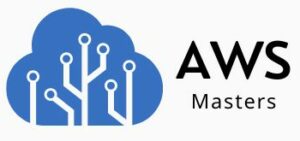AWS DevOps Engineering Training In Hyderabad
with
100% Placements & Internships
- Comprehensive Curriculum
- Expert Trainers
- Real-Time Projects
- Certification
Table of Contents
ToggleAWS DevOps Engineering Course In Hyderabad
Batch Details
| Trainer Name | Mr. Dinesh |
| Trainer Experience | 10+Years |
| Timings | Monday to Friday (Morning and evening) |
| Next Batch Date | 08-AUG-2025 AT 11:00 AM |
| Training Modes | Classroom & Online |
| Call us at | +91 9000360654 |
| Email us at | awsmasters.in@gmail.com |
| For More Details at | For More Demo Details |
AWS DevOps Engineering Institute In Hyderabad
Why choose us?
- DevOps-Focused AWS Training Track
- Trainers with CI/CD & Cloud Automation Expertise
- Docker & Kubernetes Training on AWS
- Infrastructure as Code (IaC) with Hands-On Projects
- Deep Dive into Tools like CodePipeline, CloudFormation, ECS, EKS
- Real-Time DevOps Lifecycle Implementation
- Continuous Integration & Monitoring with AWS DevOps Suite
- DevSecOps Principles & Practical Use Cases
- Step-by-Step Interview Task Practice
- Cloud-Native Architecture Implementation
- DevOps Resume Projects for GitHub Portfolio
- Certification & Career Mapping Support
AWS Devops Engineering In Hyderabad
Curriculum
Module 1 - Introduction to AWS & DevOps
- What is AWS?
- What is DevOps?
- Need for DevOps in Cloud
- DevOps Lifecycle
- Benefits of AWS for DevOps
Module 2 - Version Control with Git & GitHub
- Git Basics and Installation
- Git Commands (clone, commit, push, pull, etc.)
- Git Branching Strategies
- GitHub Repositories & Collaboration
Module 3 - Linux Fundamentals for DevOps
- Linux CLI Basics
- File Management & Permissions
- Bash Scripting Essentials
- User and Group Management
Module 4 - AWS Core Services Overview
- IAM (Users, Groups, Policies)
- EC2, S3, VPC, RDS, CloudWatch
- AWS Global Infrastructure
Module 5 - AWS Identity and Access Management (IAM)
- IAM Users, Roles, Policies
- MFA & Security Best Practices
- Identity Federation & Cross-account Access
Module 6 - Networking in AWS (VPC)
- Subnets, Route Tables, IGW, NAT
- Security Groups vs NACLs
- VPC Peering & VPN Gateways
Module 7 - Amazon EC2 Deep Dive
- Launching & Configuring EC2 Instances
- Key Pairs, EBS Volumes
- AMIs, Snapshots, Elastic IPs
- Auto Recovery
Module 8 - Amazon S3 and Storage Solutions
- Bucket Policies, ACLs
- Storage Classes & Lifecycle Policies
- Versioning & Replication
- S3 CLI Integration
Module 9 - Elastic Load Balancer (ELB) & Auto Scaling
- Types of ELBs
- Target Groups & Health Checks
- Launch Templates & Auto Scaling Groups
Module 10 - Amazon CloudWatch & CloudTrail
- Metrics, Alarms, Logs
- Custom Dashboards
- Event Rules & Notifications
- Audit Trails using CloudTrail
Module 11 - Infrastructure as Code – Introduction to IaC
- Importance of IaC in DevOps
- IaC Tools Overview: CloudFormation, Terraform
Module 12 - AWS CloudFormation Basics
- Stack & Template Concepts
- Writing JSON/YAML Templates
- Nested & Cross Stack References
Module 13 - Terraform for AWS (Part 1)
- Installing Terraform
- Providers, Variables, State Files
- Writing Basic Terraform Scripts
Module 14 - Terraform for AWS (Part 2)
- Modules and Reusability
- Workspaces & Environments
- Integrating with Git & CI/CD
Module 15 - Configuration Management with Ansible
- Ansible Architecture & YAML
- Inventory, Playbooks, Roles
- Connecting Ansible to AWS EC2
Module 16 - Jenkins – CI/CD Tool Introduction
- Jenkins Setup & Configuration
- Jobs, Pipelines, Plugins
- GitHub Integration
Module 17 - Jenkins Pipeline as Code
- Scripted vs Declarative Pipelines
- Multibranch Pipelines
- Parameterized Builds
Module 18 - Continuous Integration with Jenkins & Git
- CI Pipeline Design
- Webhooks & Git Integration
- Test Automation in CI
Module 19 - AWS CodeCommit, CodeBuild, CodePipeline, CodeDeploy
- Overview of AWS DevOps Suite
- Setting Up Repositories
- End-to-End CI/CD Pipelines in AWS
Module 20 - Docker – Containerization
- Docker Architecture
- Images, Containers, Volumes, Networks
- Dockerfile, Docker Compose
Module 21 - Docker Registry & DockerHub
- Building & Pushing Images
- Private Registry Setup
- Security Best Practices
Module 22 - Container Orchestration with Kubernetes (EKS)
- Kubernetes Architecture
- Pods, Deployments, Services
- Helm Charts & EKS Integration
Module 23 - AWS Elastic Kubernetes Service (EKS)
- EKS Setup and Configuration
- IAM Roles for Service Accounts (IRSA)
- Logging, Monitoring EKS
Module 24 - Monitoring with Prometheus and Grafana
- Prometheus Installation & Setup
- Exporters & AlertManager
- Grafana Dashboard Setup
Module 25 - Logging with ELK Stack (Elasticsearch, Logstash, Kibana)
- ELK Architecture
- Centralized Logging from AWS Resources
- Visualizing Logs with Kibana
Module 26 - AWS Systems Manager (SSM)
- SSM Agent, Run Command
- Patch Manager
- Session Manager (Secure EC2 Access)
Module 27 - Security Best Practices in AWS
- Shared Responsibility Model
- Encryption (KMS)
- Security Hub, GuardDuty, Inspector
Module 28 - DevSecOps – Secure DevOps Practices
- Secrets Management
- Integrating Security in CI/CD
- SAST & DAST in Pipelines
Module 29 - AWS Lambda & Serverless Concepts
- Writing Lambda Functions
- API Gateway Integration
- Serverless Deployment Tools (SAM, Serverless Framework)
Module 30 - Building Serverless CI/CD Pipelines
- CI/CD for Lambda Applications
- Monitoring & Versioning
- Deploying via SAM CLI
Module 31 - AWS RDS & Database DevOps
- RDS Features & Backups
- Multi-AZ, Read Replicas
- Automated DB Deployments
Module 32 - Secrets and Parameter Store
- AWS Secrets Manager
- Systems Manager Parameter Store
- Access Management
Module 33 - Blue/Green & Canary Deployments
- Deployment Strategies
- Rollback Scenarios
- AWS CodeDeploy Configs
Module 34 - Multi-Account DevOps Strategy
- AWS Organizations
- SCPs, Cross Account Access
- Centralized CI/CD Management
Module 35 - Cost Management & Billing
- Cost Explorer & Budgets
- Rightsizing & Optimization
- AWS Trusted Advisor
Module 36 - High Availability & Disaster Recovery
- Fault Tolerance Architecture
- RTO & RPO in AWS
- DR Strategies
Module 37 - Performance Tuning in AWS DevOps
- EC2, RDS, Lambda Optimization
- CDN & Caching (CloudFront)
Module 38 - Blueprints & Templates for Projects
- Ready-to-use CI/CD Templates
- Reusable Infrastructure Templates
Module 39 - Real-Time Project 1: Web App CI/CD on AWS
- Source Control → CI → CD
- Infrastructure with Terraform
- Monitoring & Logging Setup
Module 40 - Real-Time Project 2: Containerized App with EKS
- Docker → ECR → EKS
- GitOps Workflow with ArgoCD
- Alerting and Logging
Module 41 - GitOps Introduction
- GitOps Principles
- Tools (ArgoCD, FluxCD)
- GitOps for EKS
Module 42 - ChatOps and Slack Integration
- Jenkins + Slack
- DevOps Notifications
- Incident Management
Module 43 - Backup & Recovery Automation
- AWS Backup Service
- Custom Lambda Backup Scripts
Module 44 - AWS CLI & SDK Automation
- CLI Scripting
- Boto3 (Python SDK) for Automation
- S3, EC2, Lambda Scripts
Module 45 - DevOps Metrics & KPIs
- DORA Metrics
- Deployment Frequency
- Lead Time & MTTR
Module 46 - DevOps Interview Preparation
- Real Interview Questions
- Use Case-Based Discussions
- Resume & GitHub Optimization
Module 47 - Hands-on Assignments
- Weekly Lab Exercises
- Real Scenarios
- Problem Solving
Module 48 - Capstone Project
- Design to Deployment
- Team Collaboration
- End-to-End Documentation
Module 49 - AWS DevOps Certification Guidance
- AWS DevOps Engineer – Professional Overview
- Sample Questions
- Preparation Strategy
Module 50 - Mock Interviews & Career Coaching
- Technical HR Rounds
- Soft Skills Training
- Career Roadmap & Opportunities
AWS DevOps Trainer Details
INSTRUCTOR
Mr. Dinesh
Expert & Lead Instructor
10+ Years Experience
About the tutor:
Mr. Dinesh, our AWS DevOps Engineering Trainer, brings over 10+ years of industry experience in cloud computing, DevOps automation, and IT infrastructure. With deep expertise in Amazon Web Services (AWS), he has successfully implemented end-to-end DevOps solutions for top MNCs and fast-growing startups across domains such as finance, healthcare, and e-commerce.
He specializes in teaching core AWS DevOps tools and services such as EC2, S3, CodePipeline, CodeDeploy, CloudFormation, IAM, CloudWatch, Lambda, and integrates popular DevOps tools like Git, Jenkins, Docker, Kubernetes, Terraform, and Ansible. His training approach focuses on hands-on labs, real-time projects, and production-ready CI/CD pipelines, ensuring that students gain practical, job-focused experience.
In addition to technical knowledge, Mr. Dinesh mentors students on resume building, AWS DevOps certification preparation, mock interviews, and career planning. His mission is to make every learner job-ready, confident, and capable of securing roles such as AWS DevOps Engineer, Cloud Engineer, SRE, or Automation Specialist in today’s cloud-driven IT landscape.
Why Join Our AWS DevOps Engineering Institute In Hyderabad
Key Points
- Expert-Led Training by Real-Time Professionals
Our sessions are led by seasoned AWS DevOps Engineers with over 10+ years of experience in top MNCs. You’ll gain insights not just from books but from actual real-time industry use cases.
- Fully Practical, Job-Oriented Curriculum
We don’t just teach concepts—we train you to build, automate, and manage cloud infrastructure using AWS and DevOps tools through hands-on labs and real-world projects.
- Complete DevOps Ecosystem in One Program
From Git, Jenkins, Docker, and Kubernetes to Terraform, Ansible, and AWS services like EC2, S3, Lambda, and CloudFormation—you’ll master it all under one structured program.
- Live Projects with Real-World Challenges
You’ll work on real-time scenarios that simulate industry environments, giving you confidence to handle job responsibilities from day one.
- AWS Certification Preparation Included
Whether you’re aiming for Cloud Practitioner, Solutions Architect, or DevOps Engineer certifications, we provide full support with materials, quizzes, and guidance.
- Mock Interviews, Resume Help & Career Support
We prepare you not only technically but also for job hunting—via mock interviews, resume building sessions, and recruiter-focused profile reviews.
- Flexible Batches: Weekday, Weekend & Online Modes
Whether you’re a student, working professional, or career-switcher, our batch timings and hybrid learning options suit everyone’s lifestyle.
- Affordable Fees with EMI & Lifetime Access
We believe quality training should be affordable. Get value-driven education with lifetime LMS access and installment-friendly fee plans.
- 100% Placement Assistance with Real Connections
Get support beyond training—interview scheduling, job referrals, and access to our hiring network to help you land your dream AWS DevOps role.
What is AWS DevOps Engineering ?
- AWS DevOps Engineering combines Amazon Web Services (AWS) cloud platform with DevOps methodologies like automation, CI/CD, and infrastructure as code to streamline software delivery.
- AWS DevOps relies on writing infrastructure in code (e.g., using CloudFormation or Terraform), allowing you to create, update, and manage resources in a consistent, version-controlled way.
- By using DevOps tools on AWS, teams can build, test, and deploy applications faster and more reliably, reducing time-to-market and improving software quality.
- DevOps Engineers use AWS tools like CloudWatch and X-Ray to monitor applications in real time, identify issues quickly, and improve performance through continuous feedback loops.
- From provisioning servers to deploying code, AWS DevOps engineers automate repetitive tasks using tools like AWS CodePipeline, CloudFormation, and Jenkins.
- An AWS DevOps Engineer handles everything from writing code to managing deployments, security, scalability, and uptime—ensuring the full delivery pipeline is optimized.
Objectives of the AWS DevOps Engineering Training In Hyderabad
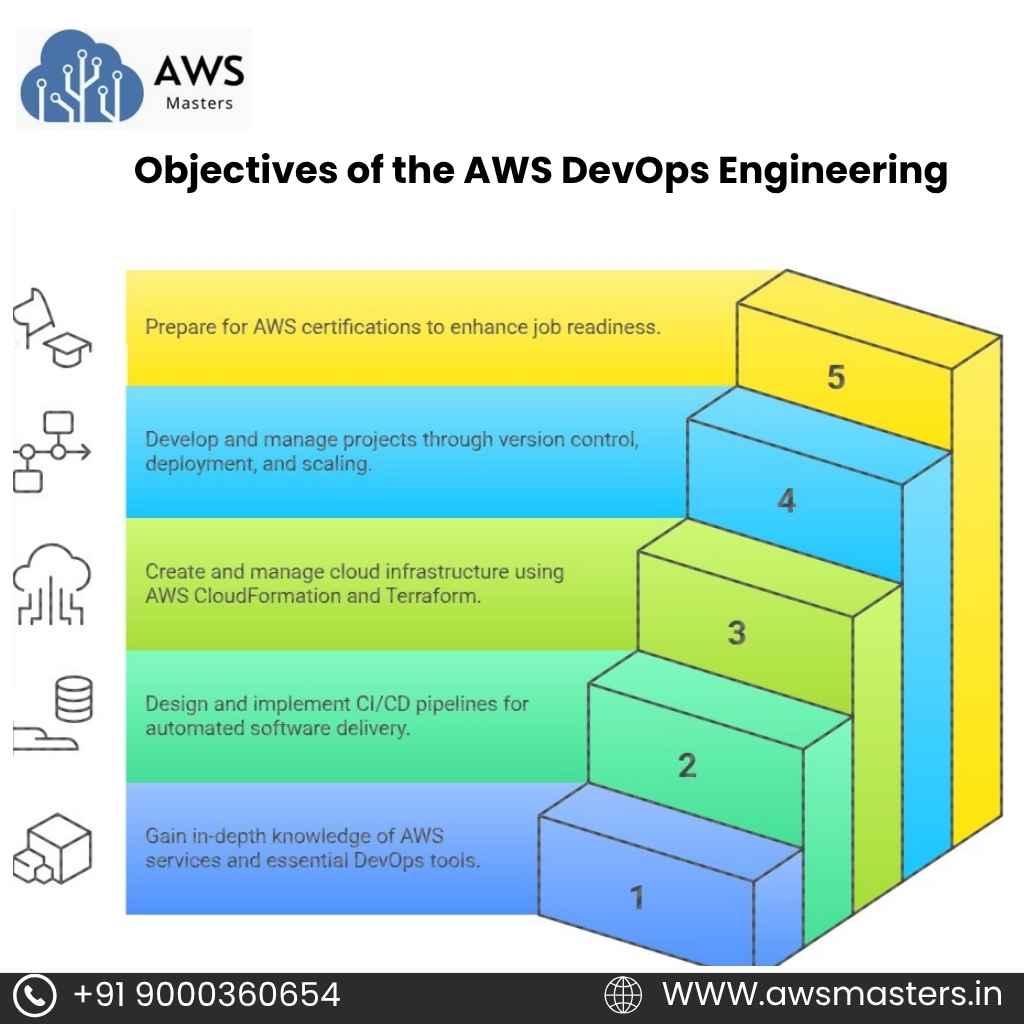
- To Provide learners with in-depth knowledge of AWS services and essential DevOps tools like Git, Jenkins, Docker, Kubernetes, and Terraform for real-world application.
- Enable students to design and implement Continuous Integration and Continuous Deployment pipelines to automate software delivery workflows.
- Train learners to create and manage cloud infrastructure using tools like AWS CloudFormation and Terraform, ensuring efficiency and consistency.
- Guide participants through full-cycle project development including version control, deployment, monitoring, and scaling cloud applications.
- Support learners with certification-focused training for AWS Cloud Practitioner, Solutions Architect, and DevOps Engineer to boost job-readiness.
Prerequisites of AWS DevOps Engineering Course
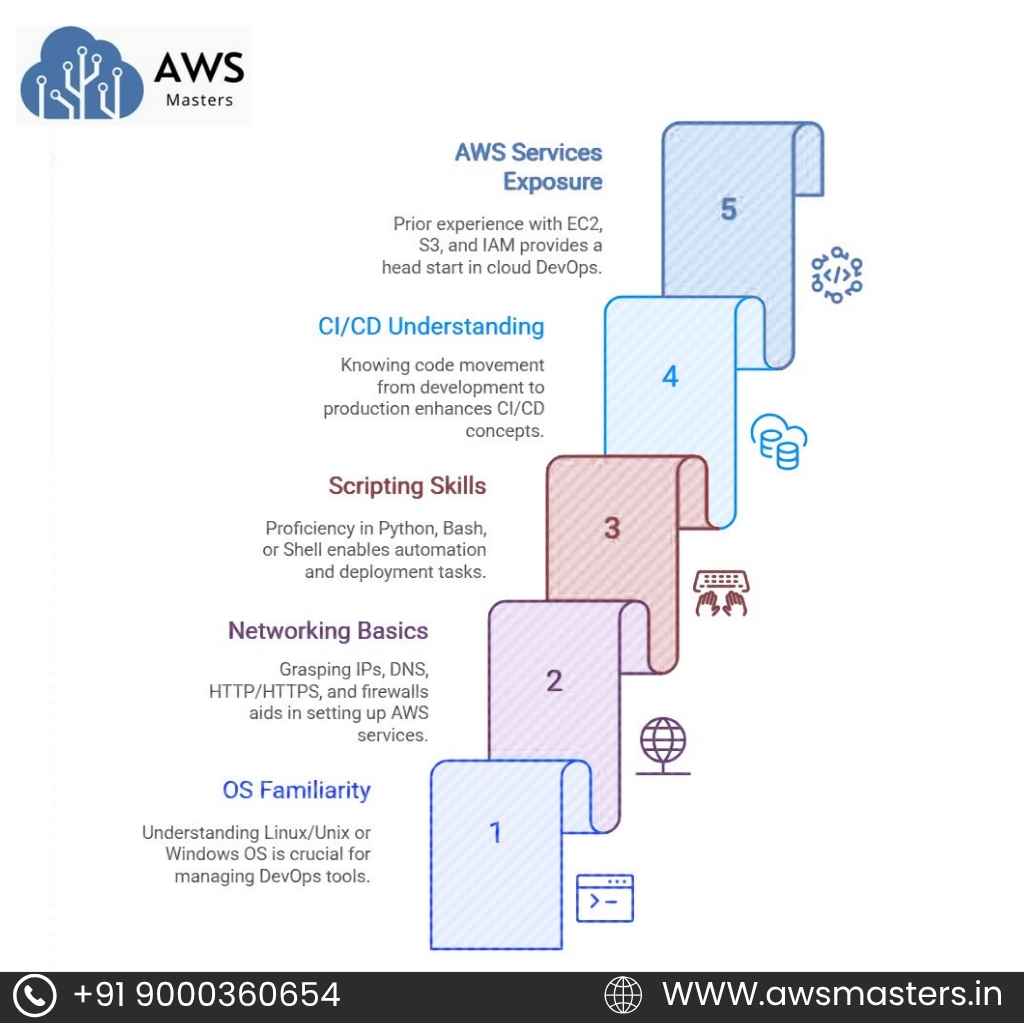
- Familiarity with Linux/Unix or Windows OS is helpful, as most DevOps tools and AWS services are managed through the command line.
- A basic understanding of IPs, DNS, HTTP/HTTPS, and firewalls will help in setting up and troubleshooting AWS services and cloud deployments.
- Knowing any scripting language like Python, Bash, or Shell helps in automation tasks, writing deployment scripts, and working with DevOps tools.
- Understanding how code moves from development to production helps you grasp CI/CD, testing, and version control concepts better.
- Though not mandatory, prior exposure to core AWS services like EC2, S3, and IAM gives a head start in understanding DevOps in the cloud.
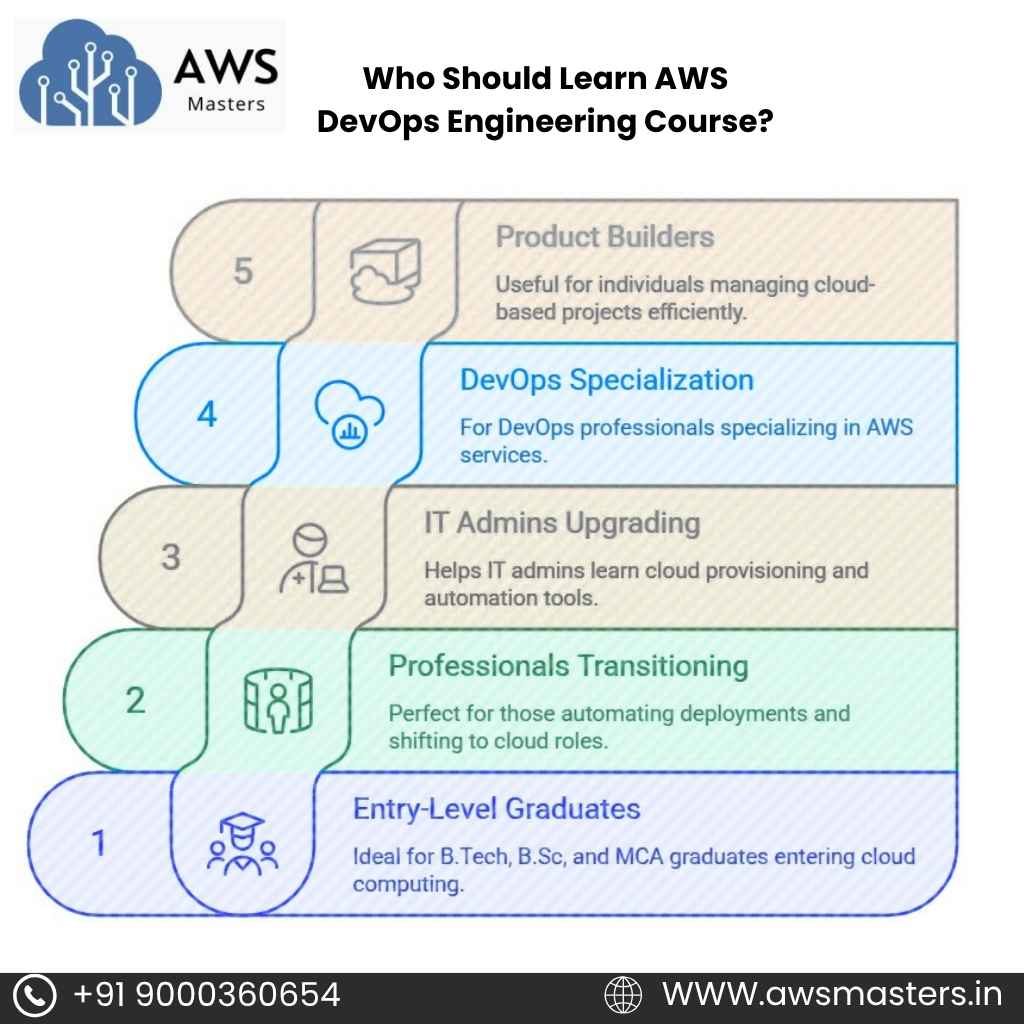
Who Should Learn AWS DevOps Engineering Course?
- Ideal for B.Tech, B.Sc, and MCA graduates looking to enter the high-demand cloud computing and DevOps domain with strong career prospects.
- Perfect for professionals who want to automate deployments, manage infrastructure, or shift into cloud-based development and DevOps roles.
- Helps IT admins upgrade their skill set by learning cloud provisioning, automation tools, and infrastructure as code with AWS.
- For existing DevOps professionals aiming to specialize in AWS-specific services, tools, and architecture for better roles and salary hikes.
- Useful for individuals building their own products or managing cloud-based projects who need to handle AWS infrastructure efficiently.
AWS DevOps Engineering Training in Hyderabad
Course Outline
Understand the basics of cloud computing, AWS architecture, and the DevOps lifecycle. Learn how cloud and DevOps together streamline software delivery.
Master Git basics, branching strategies, and collaborative workflows using GitHub. Learn how to manage source code efficiently in DevOps pipelines.
Install and configure Jenkins for automating build and deployment pipelines. Integrate Jenkins with Git, Docker, and AWS for end-to-end CI/CD.
Learn how to create, manage, and deploy Docker containers. Understand Docker images, Dockerfile, and container orchestration basics.
Set up Kubernetes clusters on AWS using EKS. Learn how to manage containerized applications, perform scaling, rolling updates, and service discovery.
Automate infrastructure provisioning using Terraform and AWS CloudFormation templates. Write reusable and scalable IaC scripts for real-world scenarios.
Track application performance and monitor AWS services using CloudWatch. Set up logs, alarms, and visualization dashboards with ELK or Grafana.
Build automated CI/CD pipelines using native AWS tools. Learn how to manage source code, automate builds, and deploy applications in different environments.
Work on live DevOps projects hosted on AWS. Get hands-on with deployment pipelines, and prepare for AWS Certified DevOps Engineer exam with mock tests and guidance.
Aws DevOps Engineering Training In Hyderabad
Modes
Classroom Training
- Daily Recorded Videos
- One - One Project Guidence
- Practical Application
- Get support till you are placed
- Mock Interviews
- Well-Organized Syllabus
Online Training
- Flexible Learning Schedule
- Recorded Video access
- Whatsapp Group Access
- Doubt Clearing Sessions
- Daily Session Recordings
- Real-world Projects
Corporate Training
- Live Project Training
- On-site or Virtual Training Sessions
- Doubt Clearing Sessions
- Daily Class Recordings
- Team-building Activities
- Video Material Access
Aws DevOps Engineering Training In Hyderabad
Career Opportunities
01
AWS DevOps Engineer
You’ll be qualified for roles as an AWS DevOps Engineer, responsible for automating infrastructure, setting up CI/CD pipelines, and managing deployments in cloud environments.
02
Cloud Engineer (AWS)
Gain the skills to work as an AWS Cloud Engineer, handling scalable architecture, serverless computing, and cloud resource management across organizations.
03
Site Reliability Engineer (SRE)
With expertise in monitoring, automation, and system reliability, you can pursue roles as an SRE, ensuring high availability and performance of cloud-based applications.
04
Infrastructure as Code (IaC) Specialist
Your knowledge in Terraform and AWS CloudFormation will open doors to roles focused on automating and managing large-scale cloud infrastructure using code.
05
DevOps Consultant / Architect
You can work as a DevOps Architect or Consultant, helping companies design and implement DevOps strategies and cloud-native architectures using AWS services.
06
Opportunities in MNCs & Startups
Top MNCs, cloud-native startups, and consulting firms actively hire AWS DevOps professionals, offering high salaries, remote work options, and global opportunities.
AWS DevOps Engineering Training Institute In Hyderabad
Skills Developed
Cloud Infrastructure Management on AWS
You’ll gain hands-on skills in provisioning, configuring, and managing scalable AWS infrastructure using services like EC2, S3, VPC, IAM, and more.
DevOps Automation & CI/CD Pipelines
Master automation using tools like Jenkins, GitHub Actions, and AWS CodePipeline. You’ll be able to build reliable CI/CD pipelines for smooth code delivery.
Containerization & Orchestration
Learn how to containerize applications using Docker and orchestrate them with Kubernetes or AWS EKS—essential skills for modern cloud deployment.
Infrastructure as Code (IaC)
Develop the ability to write and manage infrastructure using Terraform and AWS CloudFormation, enabling scalable, repeatable, and version-controlled deployments.
Monitoring & Logging Systems
You’ll acquire skills in setting up performance monitoring, log analysis, and alerting using tools like AWS CloudWatch, Grafana, and ELK stack.
Problem Solving & Real-Time Deployment
Through real-world projects, you’ll sharpen your troubleshooting, deployment, and optimization skills—making you ready for live cloud production environments.
AWS DevOps Engineering Course Online
Certifications
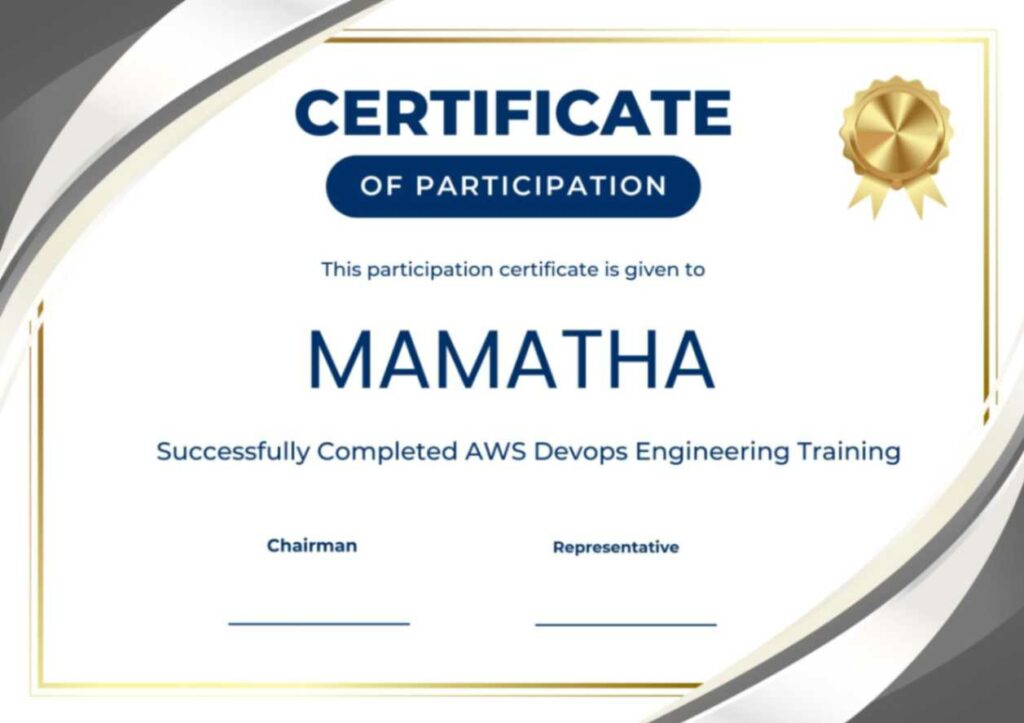
- This certification validates your expertise in designing and implementing AWS services to derive insights from data using analytics tools and data lakes.
- Gain the foundational skills required to design scalable, cost-effective, and secure cloud solutions—essential for any data engineering role on AWS.
- Though retired, concepts from this certification—like Redshift, EMR, and Kinesis—are still part of the training to ensure practical, job-relevant skills.
- Covers the integration of data-driven applications with AWS services, focusing on serverless development, API interactions, and data processing pipelines.
- The course also prepares you for complementary tools like Apache Spark, Airflow, or Snowflake certifications, depending on your career focus.
Companies that Hire From Amazon Masters












AWS DevOps Engineering Course In Hyderabad
Benefits
- Hands-On Training with Real-Time Projects
Gain practical experience by working on live data engineering projects using AWS services like Redshift, Glue, S3, Lambda, and EMR—bridging the gap between learning and doing.
- High-Demand Career Opportunities
AWS Data Engineers are in high demand across industries. This course prepares you for roles like Data Engineer, Big Data Engineer, and Cloud Data Architect with top companies.
- Comprehensive Curriculum Aligned with Industry Needs
The training covers end-to-end data pipeline creation, ETL processing, data warehousing, and analytics—aligned with real-time use cases from modern data teams.
- Certification Readiness for AWS Exams
Get complete guidance to clear key AWS certifications like Data Analytics – Specialty and Solutions Architect – boosting your professional credibility and job prospects.
- Placement Support and Career Mentorship
Benefit from resume preparation, mock interviews, and job referrals in the Hyderabad job market, with mentorship from experienced AWS data professionals.
- Flexible Learning Modes with Lifetime Access
Choose between classroom or online sessions with access to recorded content and lab exercises, allowing you to learn at your own pace and revisit topics anytime.
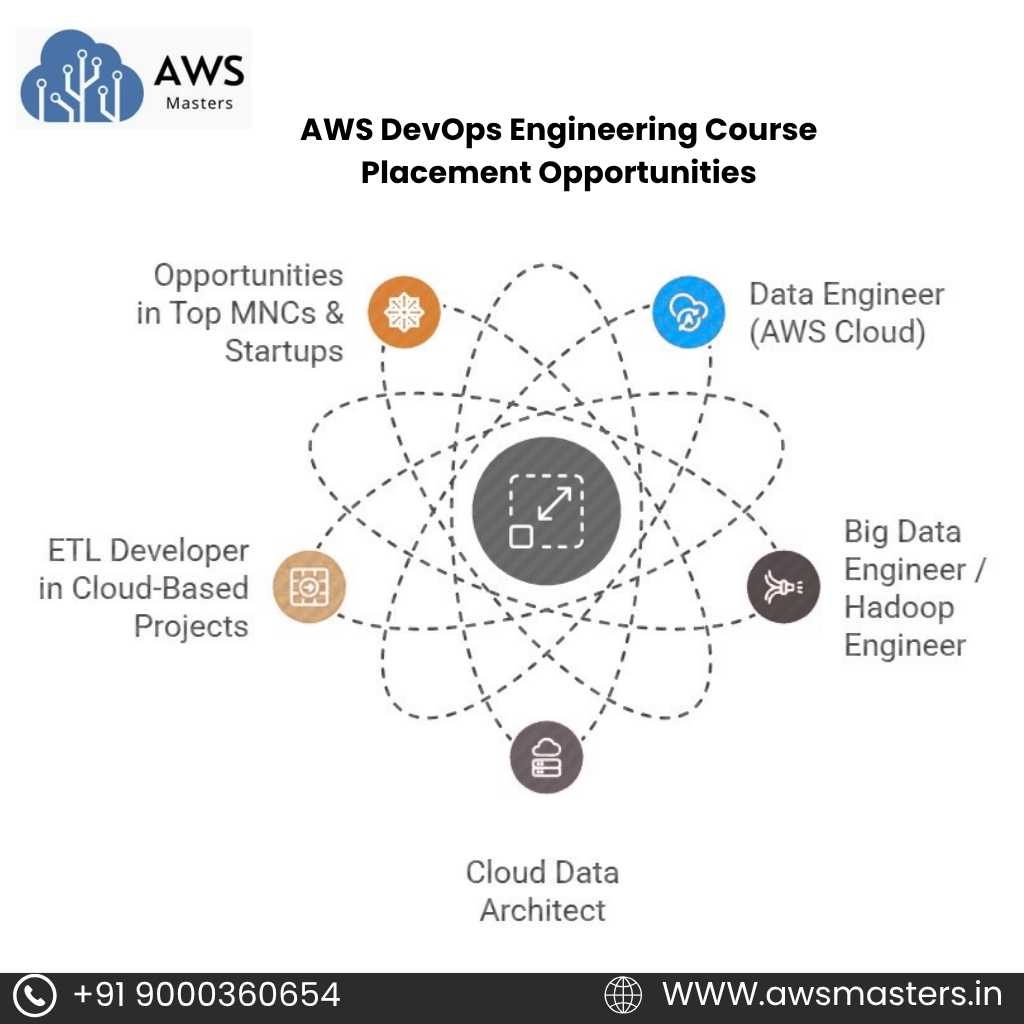
AWS DevOps Engineering Course
Placement Opportunities
- Data Engineer (AWS Cloud)
- Big Data Engineer / Hadoop Engineer
- Cloud Data Architect
- ETL Developer in Cloud-Based Projects
- Opportunities in Top MNCs & Startups
AWS DevOps Engineering Course
Market Trend
Massive Growth in Cloud Adoption
Companies across sectors are rapidly migrating to the cloud, and AWS continues to dominate the market—creating a strong demand for skilled DevOps engineers familiar with AWS services.
DevOps Roles Among Top-Paid in IT
AWS DevOps roles consistently rank among the highest-paying jobs in tech, thanks to the specialized skill set that blends cloud computing, automation, and software delivery.
CI/CD is Now a Standard Practice
Organizations now consider Continuous Integration and Continuous Deployment (CI/CD) as essential. Skilled professionals who can build and manage CI/CD pipelines on AWS are highly valued.
Shift Toward Serverless & Automation
There’s a rising trend in using AWS Lambda, Fargate, and other serverless tools. Companies want DevOps engineers who can automate infrastructure and reduce manual operations.
Hybrid & Multi-Cloud Skills in Demand
While AWS leads the cloud market, knowledge of how to integrate AWS with other platforms (Azure, GCP) is a huge plus, giving AWS DevOps engineers an edge.
Increased Focus on Security & Compliance
As cloud adoption grows, security becomes a top priority. AWS DevOps Engineers are expected to implement secure CI/CD pipelines and ensure compliance using tools like IAM and CloudTrail.
Job Market is Expanding Globally
From Hyderabad to Silicon Valley, the demand for AWS DevOps professionals is global. Remote work opportunities are also increasing for certified engineers with hands-on experience.
Certifications Driving Hiring Decisions
AWS certifications, especially DevOps Engineer – Professional, are increasingly becoming a hiring filter. Certified candidates stand out in competitive job markets and secure better roles.
1. What is AWS DevOps Engineering?
AWS DevOps Engineering combines AWS cloud services with DevOps practices to automate and streamline software development, testing, and deployment processes.
2. Who is this course suitable for?
This course is ideal for developers, sysadmins, testers, fresh graduates, and IT professionals looking to build a career in cloud automation and DevOps.
3. Do I need prior AWS knowledge?
Basic AWS knowledge is helpful but not mandatory. We cover all foundational AWS concepts as part of the training.
4. Do I need programming knowledge for this course?
Basic knowledge of scripting (Python, Bash) is recommended but not mandatory. We provide support for beginners.
5. How long is the AWS DevOps Engineering course?
The course typically spans 8–10 weeks, depending on the batch schedule (weekday or weekend).
6. Is the training online or classroom-based?
We offer both online live classes and classroom training in Hyderabad.
7. Do I get lifetime access to course materials?
Yes, you will receive lifetime access to LMS with recordings, notes, code files, and assessments.
8. What if I miss a session?
All sessions are recorded. You can access the missed sessions anytime on our LMS.
9. Is this course beginner-friendly?
Yes. It starts from fundamentals and moves toward advanced AWS and DevOps concepts.
10. Will there be a demo class?
Yes, we offer a free demo session to help you evaluate our training approach and trainer expertise.
11. What AWS services are covered in the course?
EC2, S3, IAM, Lambda, CloudFormation, CodePipeline, CodeBuild, CodeDeploy, CloudWatch, and more.
12. What DevOps tools are covered?
Git, Jenkins, Docker, Kubernetes, Terraform, Ansible, Prometheus, and ELK Stack.
13. Will I build real-time projects?
Yes, you will work on 2-3 live projects that include CI/CD pipelines and cloud automation on AWS.
14. Is Linux taught as part of the course?
Yes. We cover basic to intermediate Linux commands and shell scripting required for DevOps tasks.
15. Do you cover Infrastructure as Code (IaC)?
Absolutely! Tools like Terraform and AWS CloudFormation are included in-depth.
16. Will I learn CI/CD pipeline implementation?
Yes, you will build end-to-end CI/CD pipelines using Jenkins and AWS DevOps tools.
17. Is Kubernetes included in the course?
Yes. We teach Kubernetes basics and manage clusters using Amazon EKS (Elastic Kubernetes Service).
18. Do I need AWS certification to get a job?
Certifications help but are not mandatory. Our hands-on training focuses on real-time project skills, which recruiters prioritize.
19. Will I learn monitoring tools?
Yes. We cover AWS CloudWatch, Grafana, and Prometheus for system monitoring and logging.
20. Are serverless tools like AWS Lambda covered?
Yes. You’ll learn how to write Lambda functions and integrate them with DevOps workflows.
21. How many projects are included in the course?
You’ll complete 2 major real-time projects and several mini assignments after each module.
22. Are projects individual or team-based?
You’ll work on both solo and group projects to simulate real industry work environments.
23. Do I need to install tools on my local system?
Most tools are cloud-based. However, basic tools like Git, Docker, and VS Code can be installed locally.
24. Will I get help with project setup?
Yes, we provide step-by-step guidance and trainer support during live sessions and lab work.
25. Are projects aligned with job roles?
Yes. Projects simulate real-world tasks for roles like AWS DevOps Engineer, Cloud Engineer, and SRE.
26. Do you provide placement support?
Yes. We offer placement assistance, including resume review, mock interviews, and job referrals.
27. Will I get a course completion certificate?
Yes, you’ll receive an industry-recognized certificate after completing the course and projects.
28. What kind of job roles can I apply for?
You can apply for roles such as AWS DevOps Engineer, Cloud Engineer, Site Reliability Engineer (SRE), and Build/Release Engineer.
29. How do you prepare students for interviews?
We conduct mock interviews, technical assessments, and share frequently asked interview questions with solutions.
30. Do you assist with AWS Certification exams?
Yes, we provide complete guidance, practice tests, and dumps for certifications like AWS DevOps Engineer – Professional.
31. Which AWS certifications are relevant for DevOps?
- AWS Certified DevOps Engineer – Professional
- AWS Certified SysOps Administrator – Associate
- AWS Certified Developer – Associate
32. Is certification training included?
Yes. The course includes exam-specific guidance, syllabus mapping, and sample question discussions.
33. Do I need to take the exam immediately after the course?
It’s optional. Many students take the exam within 1–3 months of course completion.
34. Is the certification fee included in course fee?
No. Certification exam fees are paid directly to AWS, but we guide you on the registration process.
36. What cloud lab environment do you use?
We provide access to AWS Free Tier and guide you on using it efficiently without incurring charges.
37. Do you provide virtual machines?
No, as the course is cloud-focused, you will use AWS-based labs and tools on your local or cloud systems.
38. Can I practice after the sessions?
Yes, our LMS has labs, assignments, and resources you can access 24/7.
39. Do I need a high-end system?
No. A basic system with 4GB+ RAM and stable internet is sufficient for training and labs.
40. Is coding required for the tools?
Only basic scripting is required (Python, Shell). We guide you even if you’re new to coding.
41. Do I get post-training support?
Yes, we offer 3 months of post-training support for doubts and project guidance.
42. Will trainers be available for doubt clarification?
Yes. We conduct weekly doubt sessions and offer one-on-one support via our LMS platform.
43. Is there a community or forum for discussion?
Yes, we have a Telegram/WhatsApp group and discussion forums for learners.
44. Do I get soft skills or communication training?
Basic interview communication tips and resume reviews are included, especially for freshers.
45. Can I repeat classes if needed?
Yes. You can re-attend future batches of the same course at no extra cost (based on availability).
46. What is the course fee?
Please contact us directly or visit our website for the latest fee structure and discount offers.
47. Do you offer EMI or installment options?
Yes, we offer flexible payment options, including monthly installments.
48. When is the next batch starting?
New batches begin every 2–3 weeks. We offer weekday and weekend options.
49. What are the batch timings?
Batch timings include morning and evening slots to suit both working professionals and students.
50. How can I enroll?
You can enroll by contacting us via phone, website, or visiting our training center in Hyderabad.
